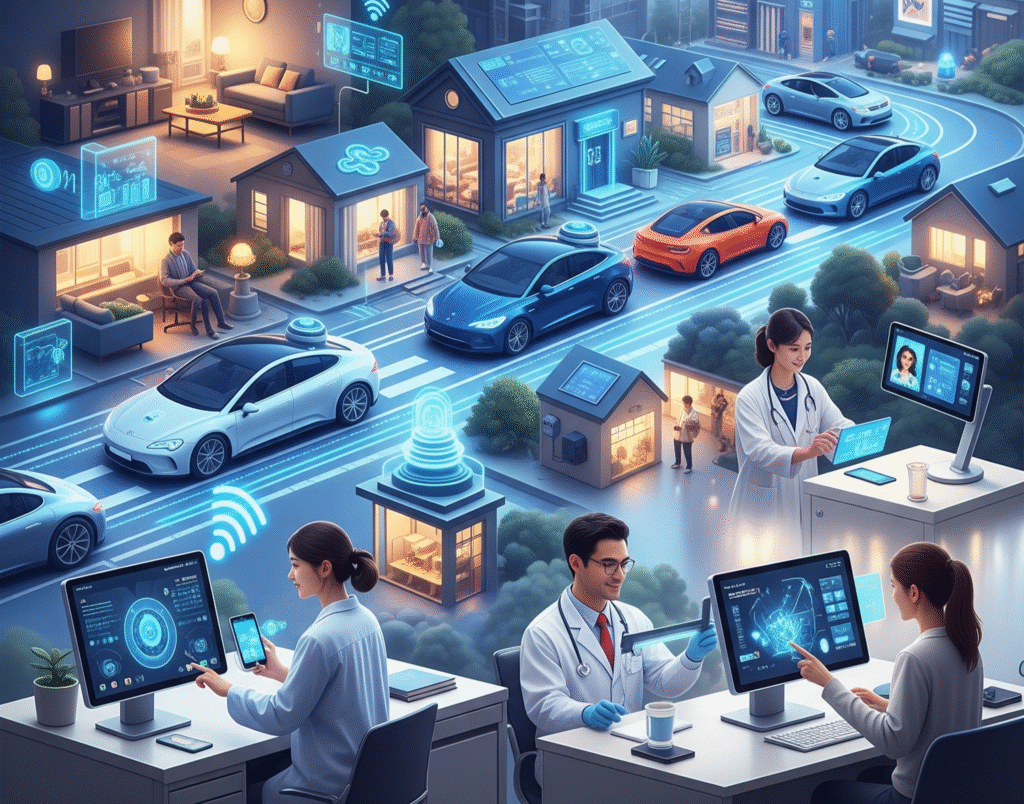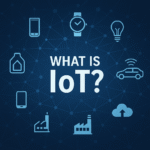Have you ever wondered how seemingly simple interactions with technology are becoming increasingly intuitive and personalized? From the moment your alarm gently wakes you to the intelligent recommendations guiding your online shopping, Artificial Intelligence in Daily Life is no longer a futuristic concept but a pervasive reality. AI’s silent revolution is reshaping our routines, transforming industries, and offering unparalleled convenience, fundamentally altering the very fabric of our existence. This isn’t just about robots taking over; it’s about smart systems enhancing our capabilities, streamlining processes, and making our lives richer and more efficient. The impact of AI on everyday life is profound, touching everything from how we communicate to how we manage our health.
The Dawn of Smart Living: AI at Home
Our homes are rapidly evolving into intelligent hubs, thanks to the continuous integration of AI. Smart home devices, once a niche luxury, are now commonplace, powered by sophisticated AI algorithms that learn our habits and preferences.
- Voice Assistants: Devices like Amazon Echo and Google Home have become indispensable. They play our favorite music, provide real-time weather updates, manage our calendars, and even control other smart appliances, all through simple voice commands. This hands-free convenience has redefined how we interact with technology within our living spaces.
- Automated Climate Control: Smart thermostats, such as Nest, utilize AI to learn our heating and cooling preferences, adjusting temperatures automatically to optimize comfort and energy efficiency. They can even detect when we’re away and save energy, reducing utility bills and our carbon footprint.
- Intelligent Security Systems: AI-powered security cameras can differentiate between pets, vehicles, and humans, alerting us only to genuine threats. Some systems can even recognize familiar faces, adding an extra layer of personalized security to our homes.
- Smart Appliances: From refrigerators that track expiry dates and suggest recipes to washing machines that optimize cycles based on fabric types, AI is making our household chores simpler and more efficient, freeing up valuable time.
The seamless integration of these technologies demonstrates how Artificial Intelligence in Daily Life is making our homes smarter, safer, and more responsive to our needs.
AI’s Role in Communication and Connectivity
The way we communicate has undergone a dramatic transformation, with AI playing a central role in making our interactions more effective and less cumbersome.
- Enhanced Messaging and Email: Predictive text and auto-correct features, powered by AI, have become ubiquitous, helping us type faster and reduce errors. Email platforms use AI to filter spam, categorize incoming messages, and even suggest quick replies, significantly boosting our productivity.
- Language Translation: Real-time translation tools, from Google Translate to specialized apps, leverage advanced AI algorithms to break down language barriers. This fosters global communication, making international travel and business interactions much smoother.
- Personalized Content Feeds: Social media platforms and news aggregators use AI to curate personalized content feeds based on our past interactions and interests. While this can lead to echo chambers, it also means we’re more likely to encounter information and entertainment that resonates with us, showcasing the pervasive impact of AI on everyday life.
Revolutionizing Transportation: Safer and Smarter Journeys
The automotive industry is at the forefront of AI innovation, aiming to make our commutes safer, more efficient, and eventually, autonomous.
- Navigation Systems: Modern GPS systems use AI to analyze real-time traffic data, weather conditions, and even road closures to provide the most efficient routes, helping us avoid delays.
- Driver-Assistance Features: Many new vehicles come equipped with AI-powered features like adaptive cruise control, lane-keeping assist, and automatic emergency braking. These systems enhance safety by actively monitoring the road and assisting drivers in critical situations.
- Autonomous Vehicles: The development of self-driving cars is perhaps the most ambitious application of AI in transportation. While still in their nascent stages, these vehicles promise to revolutionize how we travel, potentially reducing accidents and traffic congestion, highlighting a significant impact of AI on everyday life.
Healthcare Transformed: Precision and Personalization
AI is bringing about a paradigm shift in healthcare, promising more accurate diagnoses, personalized treatments, and improved patient outcomes.
- Diagnostic Tools: AI algorithms can analyze medical images (X-rays, MRIs, CT scans) with incredible speed and accuracy, often identifying anomalies that might be missed by the human eye. This leads to earlier detection of diseases like cancer, significantly improving prognosis.
- Drug Discovery: Developing new drugs is a lengthy and expensive process. AI can accelerate this by sifting through vast amounts of data, identifying potential drug candidates, and predicting their efficacy and side effects, speeding up the path to new treatments.
- Personalized Medicine: AI enables doctors to tailor treatment plans based on an individual’s genetic makeup, lifestyle, and unique health data. This approach, known as precision medicine, ensures that patients receive the most effective interventions for their specific condition.
- Remote Monitoring: Wearable devices and smart sensors, powered by AI, can continuously monitor vital signs, track activity levels, and detect irregularities, alerting healthcare providers to potential issues before they become critical. This proactive approach to health management is a testament to the positive impact of AI on everyday life.
The Future is Now: Everyday Applications and Beyond
Beyond these major sectors, Artificial Intelligence in Daily Life is influencing countless other aspects of our routines:
- Retail and E-commerce: AI powers recommendation engines that suggest products based on our Browse history and purchase patterns, making online shopping more convenient and personalized. Chatbots provide instant customer support, resolving queries and enhancing the shopping experience.
- Financial Services: AI is used for fraud detection, flagging suspicious transactions in real time. It also powers personalized financial advice, helping individuals manage their investments and budgets more effectively.
- Education: AI-powered platforms can offer personalized learning experiences, adapting to a student’s pace and style, providing tailored content, and identifying areas where they need additional support.
- Entertainment: Streaming services use AI to recommend movies and shows, while AI is also used in game development to create more realistic and adaptive environments.
The pervasive nature of AI suggests that its influence will only continue to grow, leading to even more innovative solutions and conveniences in the years to come.
The pervasive impact of AI on everyday life is undeniable and continues to accelerate. From making our homes smarter to revolutionizing healthcare and transportation, AI is silently but powerfully enhancing our capabilities and improving our quality of life. As this technology evolves, it promises even greater efficiencies, personalization, and convenience, fundamentally reshaping how we interact with the world around us. Embracing and understanding AI’s role is crucial as we navigate this exciting, intelligently connected future.


